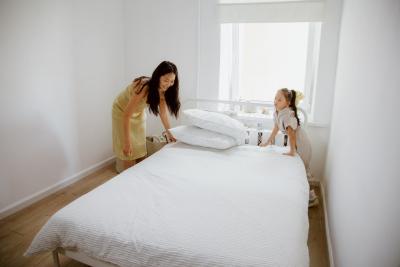Here at Happy Beds, we are committed to making sure that you get the best night’s sleep possible with our fantastic sleep tips and comfortable mattresses.
We have talked about lots of different sleep disorders, from insomnia to sleep paralysis to sleep apnea and narcolepsy, but what about restless leg syndrome? Restless leg syndrome is a relatively common disorder that around 1 in 10 people suffer from. So join us as we tell you everything that you need to know about this disorder.
What is Restless Leg Syndrome?

The NHS states that, “Restless legs syndrome, also known as Willis-Ekbom disease, is a common condition of the nervous system that causes an overwhelming irresistible urge to move the legs.”
It can be extremely unpleasant, causing creeping or crawling sensations in the feet and legs and can also be linked to the sporadic movement of the legs and arms whilst sleeping known as ‘periodic limb movements’ in sleep.
Symptoms often occur when the person is sat still for a long period of time, and this is the reason that symptoms tend to get worse before sleep, which is ultimately why it is characterised as a sleep disorder. Getting up and walking around can often help symptoms, resulting in sleepless nights. However, because the disorder encourages you to move your legs, it is also classed as a movement disorder.
Restless leg syndrome symptoms can differ in severity and frequency - some people only suffer once in a while and some, unfortunately, suffer daily.
So, now you know more about what restless leg syndrome is, let’s find out a little bit more about what causes it.
What Causes Restless Leg Syndrome?
Like many sleep disorders, it is often hard to work out a definitive cause for the disorder, but there are a couple of types of syndromes that can result in restless legs at night.
Primary Restless Legs Syndrome
This type of restless leg syndrome tends to run in families. In these cases, symptoms tend to occur before the person gets to 40 years old. Neurologists believe that this kind of restless legs syndrome may have something to do with the way in which the body handles dopamine. This is the chemical in the human body that controls muscle movement.
Secondary Restless Legs Syndrome
Secondary restless leg syndrome is usually as a result of underlying health issues such as iron deficiencies and end stage renal disease. People can also suffer from secondary restless leg syndrome as a side effect of certain medications, alcohol and even pregnancy.
What is the Best Treatment for Restless Leg Syndrome?

Restless leg syndrome treatment, like many sleep disorders, isn't always definitive. However, a change in lifestyle can really help to ease your symptoms. Avoiding caffeine in the evening, creating a regular sleep pattern with a comfortable mattress and exercising regularly can help you avoid restless legs and get a cosy night’s sleep.
There are also some specific things that you can do to ease those creeping feelings in your legs though. You can try massaging your legs in the evening and taking a hot bath before bed to relax the muscles in your legs. Walking and stretching can also help to ease your symptoms if you’re really struggling.
Weighted blankets are also said to help with restless leg syndrome as they add pressure to legs, reducing the desperate feeling of needing to move them.
Doctors can prescribe medications that increase your dopamine levels if you are really struggling, but these can come with side effects, so it’s definitely worth discussing with your GP if you are concerned.
If pain is associated with your restless leg syndrome, your doctor may also prescribe painkillers and nerve medication such as gabapentin and pregabalin. If you are suffering with restless leg syndrome, it is always a good idea to speak to your doctor first about ways to lessen your symptoms.
Do you suffer with restless leg syndrome? If so, what are your recommendations for a perfect night’s sleep? Please share them with us on Facebook, Twitter and Instagram.












